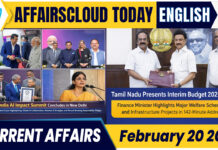We are here for you to provide the important Current Affairs January 18 2019, which have unique updates of all daily events from all newspapers such as The Hindu, The Economic Times, PIB, Times of India, PTI, Indian Express, Business Standard and all Government official websites.
Our complete current affairs helps you to get more marks in Banking, Insurance, SSC, Railways, UPSC,CLAT and all State Exams.
Useful Links:
- Current Affairs
- Current Affairs 2019
- Current Affairs January 2019
- Current Affairs December 2018
- Current Affairs November 2018
Click here for Current Affairs January 17 2019
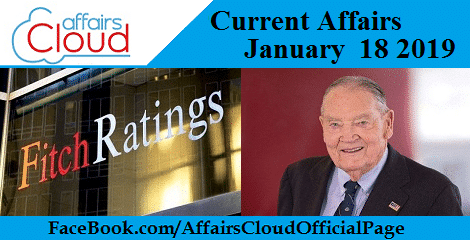 INDIAN AFFAIRS
INDIAN AFFAIRS
Cabinet Approval on January 16, 2019
- Cabinet approves regularisation of Pay Scales of below Board Level Executives in NHPC Ltd., North East Electric Power Corporation, THDC India Ltd. and SJVN Ltd. w.e.f. 1.1.97
- Cabinet approves Revised Cost of Estimates (RCE) for 13 new Central Universities in the States of Bihar, Gujarat, Haryana, Himachal Pradesh, Jammu & Kashmir (Two), Jharkhand, Karnataka, Kerala, Orissa, Punjab, Rajasthan and Tamil Nadu, set up under Central Universities Act, 2009
- Cabinet approves expenditure sanction for Integrated E-filing and Centralized Processing Centre 2.0 Project
- Cabinet approves recapitalisation of Export-Import Bank of India
- Cabinet approves setting up of crude oil pipeline from Paradip to Numaligarh and Product pipeline from Numaligarh to Siliguri……………………………………..Click here to Read more
Cabinet Approval with Foreign Countries on January 16, 2019
- Cabinet approves MoU between India and Australia on the safety in Mines, Testing and Research Station
- Cabinet approves ex-post facto approval for Agreement on the facilitation of visa arrangements signed between India and Maldives………………………………..Click here to Read more
Right of Children to Free and Compulsory Education (Amendment) Act, 2019 officially came into force: HRD Ministry
On January 10, 2019, the President of India, Shri. Ram Nath Kovind gave his assent to the Right of Children to Free and Compulsory Education (Amendment) Act, 2019.
i. It was passed by the Parliament on 3rd January, 2019.
ii. It has also been notified in the Gazette of India on January 16, 2019, which is when it came into force.
About the Act:
i. Earlier it was called the ‘Right of Children to Free and Compulsory Education Act, 2009’.
ii. The following changes have been made:
- There shall be a regular examination in the fifth class and in the eighth
class at the end of every academic year,
- If a child fails in the examination, he shall be given additional instruction and granted opportunity for re-examination within a period of two months from the date of declaration of the result.
- Government may allow schools to hold back a child in the fifth class or in the eighth class or in both classes, if he fails in the re-examination.
- No child shall be expelled from a school till the completion of elementary education.
Ministry of Human Resource Development:
♦ Union Minister: Shri. Prakash Javadekar.
♦ Minister of State: Dr. Satya Pal Singh.
ISRO’s UNNATI programme inaugurated by MoS DoS Dr. Jitendra Singh in Bengaluru
On January 17, 2019, Minister of State in Department of Space Dr. Jitendra Singh inaugurated the 1st batch of UNNATI programme of Indian Space Research Organisation (ISRO) in Bengaluru, Karnataka.
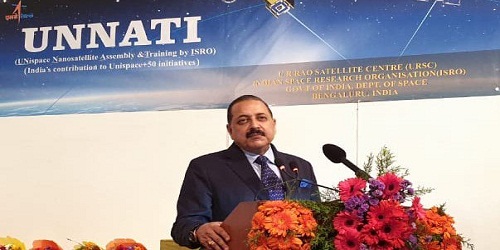 i. The full form of UNNATI is: Unispace Nanosatellite Assembly and Training programme.
i. The full form of UNNATI is: Unispace Nanosatellite Assembly and Training programme.
ii. It has been launched by ISRO as part of initiative by United Nations Office for Outer Space Affairs to commemorate the 50th anniversary of the first United Nations Conference on the Exploration and Peaceful Uses of Outer Space (UNISPACE-50).
About UNNATI:
i. Under the 1st batch of the program, India will provide 2 months training to 32 participants from 18 countries from Algeria, Argentina, Azerbaijan, Bhutan, Brazil, Chile, Egypt, Ethiopia, Indonesia, Kazakhstan, Malaysia, Mexico, Mongolia, Morocco, Myanmar, Oman, Panama and Portugal.
ii. The participants were selected from 87 applications from 34 countries.
iii. Overall, the programme would be conducted for 3 years by U.R. Rao Satellite Centre of ISRO in 3 batches and will target to benefit officials of 45 countries.
For more information: Click Here
ISRO:
♦ Headquarters: Bengaluru.
♦ Chairman: Dr K Sivan.
Eight-member Group of Ministers under Maharashtra Finance Minister Sudhir Mungantiwar panel is formed to study uniform tax rate on lottery
On 16th January 2019, the GST council has constituted an eight member Group of Ministers(GoM) headed by Maharashtra State Finance Minister, Sudhir Mungantiwar to suggest whether a uniform tax rate should be imposed on lotteries or the current differential tax rate system be continued.
The Complete list of Group of Ministers (GoM)
| Name | Designation with State |
| Sudhir Mungantiwar | Maharashtra State Finance Minister |
| Thomas Isaac | Kerala Finance Minister |
| Amit Mitra | West Bengal Finance Minister |
| Assam Finance Minister | Himanta Biswa Sarma |
| Manpreet Singh Badal | Punjab Finance Minister |
| Mauvin Godinho | Goa Panchayat Minister |
| Krishna Byre Gowda | Karnataka Finance Minister |
| Jarkar Gamlin | Arunachal Tax and Excise Minister |
Key Points
i. Joint Secretary of CBIC, Shri Manish Sinha will be the Secretary of the Group of Ministers (GoM).
ii. GoM will be assisted by a Committee of Officers from the Centre and State on the issues relating to lottery.
iii. Currently a state authorized lottery attracts 28% tax while state organized lottery attracts 12% tax.
iv. The committee will also look whether private persons authorized by the states are misusing the lower rate and getting enriched themselves at the cost of the state or not and suggest measures to curb it.
v. The GoM will submit its report on the issues relating to the lottery to GST Council in the next meeting of GST Council.
About GST council
i. GST Council is the governing body of GST having 33 members
ii. The council is headed by the union finance minister Arun Jaitley assisted with the finance minister of all the states of India.
iii. At midnight of 1st July 2017 GST was launched by then President of India Shri.Pranab Mukherjee and Prime Minister Shri Narendra Modi.
President of India inaugurated Gandhian Resurgence Summit in Prayagraj,Uttarpradesh
On 17th January 2019, honorable President of India Shri. Ramnath Nath Kovind inaugurated the three-day Gandhian Resurgence Summit on the occasion of Father of the Nation Mahatma Gandhi’s 150 birth anniversary at Prayagraj in Uttar Pradesh.It concludes on 19th January,2019.
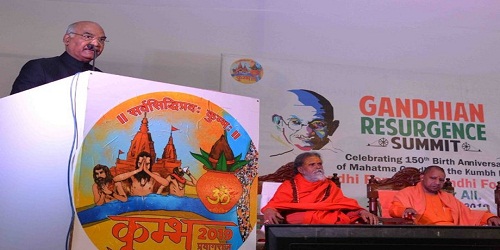 Key points
Key points
i. The summit was organised by the Parmarath Niketan, the Harijan Sevak Sangh and the Global Interfaith WASH Alliance.
ii. The President also unveiled the statue of Maharishi Bhardwaj in the town.
iii. Mr Kovind participated in Vishwa Shanti Yagya at Parmarth Niketan in Arail.
About Kumbh Mela 2019
i. On 15th January 2019, Kumbh Mela commenced at Sangam at Prayagraj in Uttar Pradesh.
ii. Slogan used by the devotees is “Chalo Kumbh Chale”.
iii. The UP government has allocated Rs.4,200 crore for the Kumbh Mela 2019.
iv. A mobile app named ‘Kumbh Mela Weather Service’ has also been developed to give information about weather during Kumbh Mela.
v. For the first time at the Kumbh Mela, a transgender ashram, Kinnar Akhara, led by rights activist Lakshmi Narayan Tripathi from Mumbai was formed and three women police station was also formed for the first time.
About Uttar Pradesh
♦ Chief Minister: Yogi Adityanath.
♦ Governor: Ram Naik.
♦ National Parks: Dudhwa National Park, Pilibhit Tiger Reserve.
♦ Wildlife Sanctuary:Sandi Bird Sanctuary,Bakhira WLS, Chandraprabha WLS, Hastinapur WLS, National Chambal WLS, Nawabganj WLS.
Commerce Minister Suresh Prabhu inaugurated the 10th edition of the India Rubber Expo – 2019 in Mumbai
On January 17, 2019, Union Minister for Commerce and Industry, Suresh Prabhu inaugurated the three-day 10th India Rubber Expo – 2019 at the Bombay Exhibition Centre in Mumbai.It concludes on 19th January,2019.
 i. He announced that a National Rubber Policy would soon be put to place to improve productivity of the sector enabling India’s efforts to become a 5 trillion-dollar economy.
i. He announced that a National Rubber Policy would soon be put to place to improve productivity of the sector enabling India’s efforts to become a 5 trillion-dollar economy.
ii. The India Rubber Expo is Asia’s largest rubber expo. The event offers a unique opportunity for Indian companies to meet and collaborate with overseas companies.
10-day Indian Panorama Film Festival held in New Delhi
On January 13, 2019, the 10-day Indian Panorama Film Festival, that was inaugurated by Secretary, Ministry of I&B, Shri Amit Khare, concluded at Siri Fort Auditorium II, in New Delhi. It commenced on January 4, 2019.
 i. It was organized by: Directorate of Film Festivals, Ministry of I&B.
i. It was organized by: Directorate of Film Festivals, Ministry of I&B.
ii. The opening feature film of the festival was ‘Olu’, directed by Shri Shaji N Karun.
iii. The opening non-feature film of the festival was ‘Kharvas’, directed by Shri Aditya Suhas Jambhale.
iv. In this festival, 26 Feature Films and 21 Non-Feature Films were screened.
v. Additionally, all the films selected under the Indian Panorama section in the 49th International Film Festival of India were screened during the Festival.
Ministry of Information & Broadcasting:
♦ Minister of State (I/C): Shri. Rajyavardhan Rathore.
2nd phase of the Web Campaign ‘SANJHI –MUJH MEIN KALAKAR’ launched by Sangeet Natak Akademi
On January 16, 2019, the National Academy of Music, Dance and Drama, Sangeet Natak Akademi (SNA) launched the second phase of the Web Campaign ‘SĀNJHI –MUJH MEIN KALĀKĀR’.
Objective:
To document and promote direct public-participation in the Intangible Cultural Heritage (ICH) and diverse cultural traditions of the country
Key Points:
i. The literal meaning of the term SĀNJHI is “to share” and “to partner”.
ii.The second phase of this campaign, SĀNJHI –MUJH MEIN KALĀKĀR, will focus mainly in areas like- the folk, traditional, customary, socially events and ritualistic art forms.
iii.This second phase would focus around the time of harvest festival season of January which is dubbed in many nomenclatures like Makar Sankranti, Pongal, Lohri, Bhogali Bihu, Torgya, Uttarayan, Attukkal Pongal etc.
iv. This would integrate domains of intangible cultural heritage as per the Convention of Safeguarding the ICH under UNESCO. They are:
- Oral traditions and expressions, including language as a vehicle of the intangible cultural heritage;
- Performing arts;
- Social practices, rituals and festive events;
- Knowledge and practices concerning nature and the universe;
- Traditional craftsmanship.
v. The first phase of this campaign was initiated in the month of November 2018 during the festival season of Diwali.
About Sangeet Natak Akademi (SNA):
The Sangeet Natak Akademi (SNA) is the nodal agency of the Ministry of Culture, Govt. of India related to Intangible Cultural Heritage and various UNESCO Conventions addressing Cultural Diversity and promotion of cultural traditions of the country.
Ministry of Culture:
♦ Minister of State (I/C): Dr. Mahesh Sharma.
INTERNATIONAL AFFAIRS
14th Global Risks Report, the 2019 edition, was released by World Economic Forum Released
On January 16, 2019, the World Economic Forum released its 14th edition of annual Global Risk Report 2019 ahead of the World Economic Forum’s Annual Meeting in Davos.
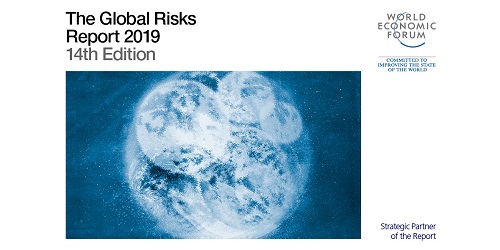 About the Report:
About the Report:
i. The report’s findings are based on the annual Global Risks Perception Survey, which asks the Forum’s network of business, government, civil society and thought leaders to gauge the risks facing our world.
ii. The risks in the report has been divided into 2 parts:
Top 10 Risks by Likelihood and Top 10 Risks by Impact.
iii. Further the risks were divided into 5 categories of: (1)economic vulnerabilities, (2) geopolitical tensions, (3) societal and political strains, (4) environmental fragilities, and (5) technological instabilities.
iv. It was done in partnership with: Marsh McLennan Companies and Zurich Insurance Group.
Highlights of the report:
i. Risks of major -power political confrontations are imminent.
ii. With risks intensifying, the collective will to tackle them is lacking.
iii. Environmental threats dominate the list for the third year in row – both in terms of impact and likelihood.
iv. ‘Failure of climate-change mitigation and adaptation’ – is in second place on both lists of likelihood and impact.
v. Cyber-attacks feature in both top 10s, at number five for likelihood and seven for impact, while data fraud is at number four for likelihood, reflecting an overall trend as technology shapes the risk landscape.
vi. In terms of Societal Risk, water crises, defined as “a significant decline in the available quality and quantity of fresh water, resulting in harmful effects on human health and/or economic activity has also featured.
vii. The report also warns of the macroeconomic risks that could be faced ahead in 2019.
For more information: Click Here
World Economic Forum:
♦ Headquarters: Geneva, Switzerland.
♦ Founder and Executive Chairman: Mr. Klaus Schwab.
BANKING & FINANCE
Banks led by SBI agreed to finance Nagpur-Mumbai Samruddhi Corridor
On January 17, 2019, the Maharashtra Chief Minister’s Office in Mumbai announced that SBI along with others banks agreed to provide finance for Nagpur-Mumbai ‘Samruddhi Corridor’ expressway project.
i. Among the consortium of banks, SBI will be providing the highest amount which is Rs. 8,500 crore.
ii. Other parties include: Punjab National Bank, Bank of Baroda, Bank of Maharashtra as well as the Life Insurance Corporation (LIC) of India.
About the Project:
i. The estimated cost of the project, being constructed by the Maharashtra State Road Development Corporation, is around 50,000 crores.
ii. Out of this, around 26,000 crores are required for the construction of the expressway.
iii. The corridor will have 25 toll plazas, and the toll will be collected for 40 years.
Background:
♦ The state government was falling short of 3,000 to 4,000 crores to reach the target of 26,000 crore rupees.
RBI injected 10,000 crore rupees into the system through the purchase of government securities
On January 16, 2019, the Reserve Bank of India announced that it will inject 10,000 crore rupees into the system to increase liquidity through open market operations (OMOs).
i. The offers have been instructed to be submitted in electronic format on the RBI Core Banking Solution (E-Kuber) system.
ii. It also plans to inject liquidity under OMOs for 50,000 crore rupees in January 2019.
iii. The central bank has so far injected Rs 20,000 through OMOs in January 2019.
RBI eased norms for external commercial borrowings by launching new Framework
On January 16, 2019, RBI announced the New External Commercial Borrowings (ECB) Framework.
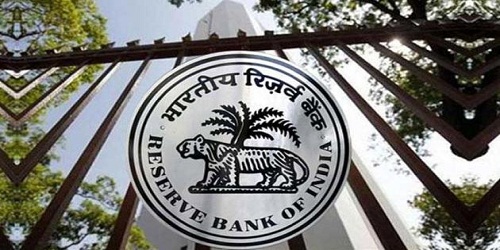 Objective:
Objective:
To promote ease of doing business
i. According to the announcement, a few changes has been made. They are:
- RBI rationalised the overseas borrowing norms allowing a uniform borrowing limit of Rs 750 million a year across tenors.
- The list of eligible borrowers has been expanded to enable all entities eligible to receive foreign direct investment under the ECB framework.
- Any entity who is a resident of a country which is FATF or IOSCO compliant will be treated as a recognised lender. This in term increases the lending options for lenders.
- The minimum average maturity period (MAMP) has been kept at 3 years for all ECBs, irrespective of the amount of borrowing, except the borrowers specifically permitted in the circular to borrow for a shorter period.
- A late submission fee for delay in prescribed reporting under the ECB framework have been introduced.
- Tracks I (medium term ECB of three to five years)and Track II (long term ECB of upto ten years ) under the existing framework have been merged as “Foreign Currency denominated ECB” and Track III and Rupee Denominated Bonds framework are combined as “Rupee Denominated ECB” to replace the current four-tiered structure, making the framework instrument-neutral.
For more information: Click Here
Background:
♦ The government has been opening up this sector to attract capital flows ever since the rupee started depreciating steeply vis-a-vis the dollar since April 2018.
RBI fined Bank of Maharashtra with 1 Crore
On January 16, 2019,Reserve Bank of India (RBI),imposed a Rs 1-crore penalty on state-owned Bank of Maharashtra (BoM) for non-compliance of Know Your Customer (KYC)guidelines and fraud-classification norms.
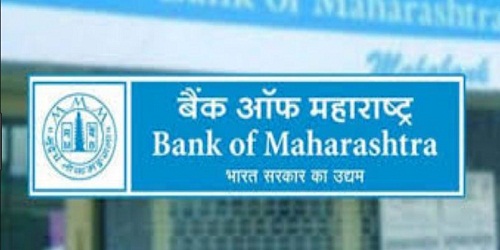 i. The penalty has been imposed on failure of the bank to follow the rules and regulation issued by the RBI.
i. The penalty has been imposed on failure of the bank to follow the rules and regulation issued by the RBI.
ii. In the year 2018, the RBI had imposed a penalty of Rs 1 crore on BoM on account of delay on the part of the bank to detect and report fraud in accounts.
BUSINESS & ECONOMY
SEBI issues draft norms for commodity indices
On 16th January 2019, Securities and Exchange Board of India (SEBI) issued drafts norm for commodity indices allowing trading in commodity-index-based futures.Earlier only individual commodity futures and options on it were allowed.
Only contracts that are compliant with certain conditions would be allowed to be part of the indices.
Key points
i. SEBI proposed a maximum weightage of 20% and minimum 1% for a constituent.
ii. As per the drafts norms, the contracts should have traded for at least 90% of trading days in last 12 months and they should have a minimum average daily turnover. The turnover should be at least Rs 75 crore for agricultural and agri-processed commodities, and Rs 500 crore for all other commodities.
iii. Future contracts concerned should have been trading in the particular exchange for at least 12 months before re-balancing an index.
iv. Initially tenor of the contracts can be of six months with a contract size of at least Rs 5 lakh.
v. The draft norms are the recommendations made by the Commodity Derivatives Advisory Committee (CDAC) set by SEBI 3 years ago.
About Commodity Index
A commodity index is an investment vehicle that tracks a basket of commodities to measure their price and investment return performance. These indexes are allowing investors to gain easier investment access to commodities without having to enter the futures market and are often traded on exchanges.
About SEBI
♦ Headquarter: Mumbai, Maharashtra
♦ Chairman: Ajay Tyagi
♦ Formed: 12 April 1992.
SEBI issued norms for mutual fund investments in derivatives
On January 16, 2019, Markets regulator SEBI allowed mutual fund schemes (except Index Funds and ETFs) to write call options only under a covered call strategy for constituent stocks of Nifty 50 and Sensex indices.
i. The announcement includes the following:
- The total notional value of call options written by a scheme shall not exceed 15per cent of the total market value of equity shares held in that scheme.
- The total number of shares underlying the call options written should not exceed 30per cent of the shares of a particular company held in the scheme.
- No scheme shall write a call option without holding the underlying equity shares.
- The call option written should be marked to market daily and the respective gains or losses should be factored into the daily net asset value of the respective scheme until the position closes or expires.
- The risks and benefit of the same, must be disclosed in the Scheme Information Document.
For more information: Click Here
What is call options:
- Generally, call options refer to an agreement that gives a buyer the right to purchase an asset at a specified price within a particular time period.
- Currently, mutual fund schemes are permitted to undertake transactions in equity derivatives but cannot write options or purchase instruments with embedded written options.
SEBI:
♦ Headquarters: Mumbai.
♦ Chairman: Shri. Ajay Tyagi.
GDP growth likely to be tad higher at 7.5% in FY20: India Ratings and Research
On 17th January 2019, a Fitch group company India ratings and research estimated that India’s GDP growth to be a “tad higher” at 7.5% in financial year 2019-20. Earlier it was 7.2% during fiscal year 2018-19.
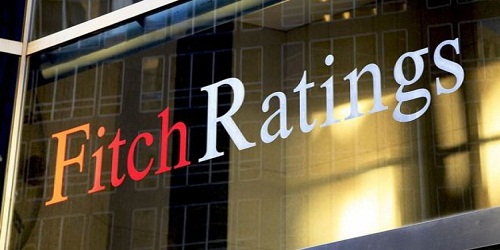 Key points
Key points
i. The economy seen a growth rate of 7.2% in the current financial year against 6.7% in the previous year estimated by Central Statistics Office (CSO).
ii. According to India Ratings investments are slow but steady gaining traction with gross fixed capital formation growing 12.2% in FY19 and projected to grow at 10.3% in FY20.
iii. According to Fitch rating current fiscal has seen sharp recovery after demonetization and GST (Goods and Services Tax).
About Fitch Rating company
♦ Headquarter: New York
♦ Founder : John Knowles Fitch
AWARDS & RECOGNITIONS
WHO Goodwill ambassador Yohei Sasakawa received Gandhi Peace Prize for 2018
On January 17, 2019, Yohei Sasakawa was named to receive Gandhi Peace Prize for 2018,who is the Goodwill Ambassador of the World Health Organization for Leprosy Elimination.The award will be given to Yohei Sasakawa in recognition of his work towards the eradication of the disease in India and across the world.
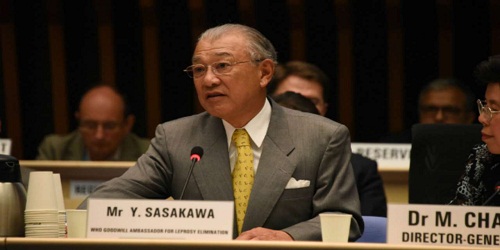 Key points to be Noted:
Key points to be Noted:
i. The award was instituted by the Government of India in 1995 during the commemoration of 125th Birth anniversary of Mahatma Gandhi.The title winners would receive a cash prize of Rs.1 crore. The Indian government had instituted the award in 1995 to honour individuals and institutions for their contribution towards social, economic and political transformation through non-violence and other Gandhian methods.
ii. The committee under the Chair of Prime Minister Shri NarendraModi comprising the Chief Justice of India,Justice Ranjan Gogoi(45th chief justice), Speaker of LokSabha Smt. Sumitra Mahajan, Leader of the single largest Opposition Party in LokSabha Shri. MallikarjunaKharge and Member of Parliament, Shri L.K. Advani decided to select this organisation and persons in recognition to their outstanding contributions in the specific fields.
iii. The first recipient of the award was Julius K Nyerere, former President of Tanzania in 1995.
iv . The list of winners have been announced after a gap of four years.Following are the chosen as the winners for the following years:
- Vivekananda Kendra, Kanyakumari bagged the award for the 2015.it is entitled as the winner for its contribution in rural development, education, and development of natural resource
- For 2016, the AkshayaPatra Foundation was honoured for its work towards providing midday meals to children across India, and Sulabh International for its contribution towards the improvement of sanitation facilities in India and the emancipation of manual scavengers.
- EkalAbhiyan Trust received the award for year 2017 for its work in the field of education for rural and tribal children, rural empowerment and gender and social equality.
India born, Dr. Rattan Lal honoured with 2019 Japan Prize for his contributions in “Biological Production, Ecology”
On January 16, 2019, the Japan Prize Foundation announced India born professor Dr. Rattan Lal as the recipient of the 2019 Japan Prize in the field of “Biological Production, Ecology”.
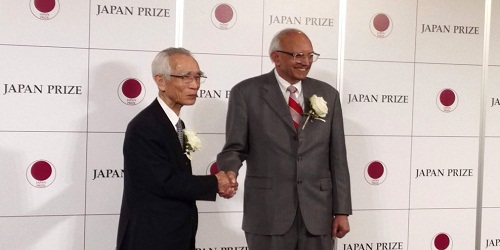 i. Dr. Yoshio Okamoto was announced to be the recipient of the 2019 Japan Prize on of “Materials and Production” field.
i. Dr. Yoshio Okamoto was announced to be the recipient of the 2019 Japan Prize on of “Materials and Production” field.
ii. Each laureate will receive a certificate of recognition and a commemorative gold medal.
iii. A cash award of 50 million Japanese yen (approximately $450,000 USD) will also be given to each prize field.
About the Award:
♦ The Japan Prize is highly competitive: the nomination process ends in February, and, every year from March to November, the Foundation considers the nominations of 15,000 prominent scientists and researchers from around the world.
♦ The 2020 Japan Prize will focus on fields of the fields of “Electronics, Information and Communication” and “Life Science”.
Japan:
♦ Capital: Tokyo.
♦ Currency: Japanese yen.
APPOINTMENTS & RESIGNS
President Kovind approved elevation of Justice Sanjiv Khanna, Justice Dinesh Maheshwari to Supreme Court
On January 16, 2019, President Ram Nath Kovind approved the elevation of Justice Sanjiv Khanna and Justice Dinesh Maheshwari to the Supreme Court.
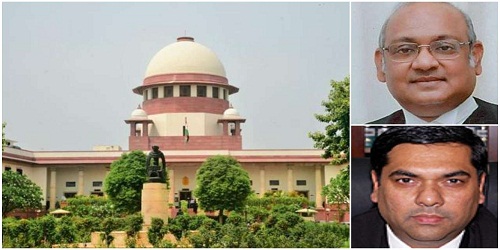 i. Justice Khanna is presently a judge of the Delhi High Court.
i. Justice Khanna is presently a judge of the Delhi High Court.
ii. Justice Maheshwari is the Chief Justice of the Karnataka High Court.
iii. The elevation was done under the recommendations of the Supreme Court collegium headed by Chief Justice of India Justice Ranjan Gogoi.
iv. The appointments of the two judges took the total strength of the Supreme Court to 28 as against a sanctioned strength of 31.
Background:
♦ The Chief Justice of India and the Judges of the Supreme Court are appointed by the President under clause (2) of Article 124 of the Constitution.
President appoints senior advocate Sanjay Jain as Additional Solicitor General in Supreme court
On January 16, 2019,President Ram Nath Kovind appointed senior advocate Sanjay Jain as Additional Solicitor General of India for the Supreme Court.He will be on the post till June 30,2020.
Key points to be noted:
i. Additional Solicitor General, appointed under Law Officers Act 1987, is the third largest law officerof the Central Government. It is a duty of the Additional Solicitor Genral to assist the Solicitor General.
ii. The President of India Ramnath Kovind also appointed Senior Advocate KM Nataraj as the Additional Solicitor General (ASG) in the Supreme Court of India. His term will also end on June 30, 2020.He also holded the post as the Additional Advocate-General of Karnataka for four years from 2009 and also as the Additional Solicitor General of India for Southern Zone for a period of 03 years.
Additional news to be Noted:
Advocate Madhavi Divan was appointed ASG(Additional Solictor General) in the Supreme Court and became the third woman to become an ASG (Additional Solictor General) in the Supreme Court.
SCIENCE & TECHNOLOGY
IOHR launched world’s first television channel for human rights in London
On January 16, 2019, world’s first television channel dedicated to human rights was launched in London by the International Observatory of Human Rights (IOHR).
i. It would be a web-based channel would bring human rights issues to audiences in over 20 countries across Europe, Latin America and the Middle East.
ii. Initally the programmes would be broadcasted in English but other languages including Farsi, Turkish, Arabic and Russian would be inducted in the future.
iii. Also a mobile app for the channel would be launched.
International Observatory of Human Rights (IOHR):
♦ Headquarters: London.
♦ Director: Valerie Peay.
SPORTS
Stephen Constantine steps down as coach of Indian football tea
On January 15, 2019,Stephen Constantine steps down as the head coach of the Indian Football team following the team’s exit from 2019 AFC (Asian Football Confederation) Asian Cup. India faced failure against Bahrain at the Sharjah Stadium.
 This was Constantine’s second regime as India’s Head Coach after 2005. He returned to the hot seat in 2015, succeeding Dutch Wim Koevermans.
This was Constantine’s second regime as India’s Head Coach after 2005. He returned to the hot seat in 2015, succeeding Dutch Wim Koevermans.
OBITUARY
Vanguard Group Founder John C. Bogle passed away
On January 16, 2019,John C. Bogle, who founded the Vanguard Group of Investment Companies in 1974 and built it into a giant kingdom, with $4.9 trillion in assets under management,died at the age of 89.
 Bogle was also a best-selling author,Stay the Course: The Story of Vanguard and the Index Revolution is the recent and the last master piece written by him.
Bogle was also a best-selling author,Stay the Course: The Story of Vanguard and the Index Revolution is the recent and the last master piece written by him.



